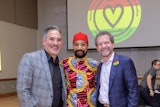JACKSON, Miss. — While Mississippi’s racial politics loomed awkwardly as much as the state flags incorporating the Confederate Battle emblem flying on nearby buildings, scholars gathered in the state capital this past weekend for two conferences, one on the legacy of Islamic West Africa, another on slavery.
Dr. Sylviane Diouf, a writer at New York’s Schomburg Center for Research in Black Culture, discussed Islamic scholars who were captured and enslaved, most notably Omar ibn Said, who penned an autobiography.
“Muslims used literacy to maintain their identity, to plan revolts … literacy was subversive in the Americas,” Diouf said. She said their writings “tell us about the triumph of the human spirit … that the transatlantic slave trade did not obliterate it.”
Omar ibn Said, a prominent scholar from the region between the Senegal and Gambia rivers, was captured in 1807 and sold to Europeans. He ended up on a North Carolina plantation. His autobiography was sold at auction in 1998 to collector Tariq Beard, who also was a presenter at the conference.
More than three dozen scholars, religious leaders and community activists examined the influences of West African Islam on the world, how slavery has impacted American culture, and the ties between slavery and Islam. The four-day conference was the result of joint leadership between Mississippi’s International Museum of Muslim Cultures, Tougaloo College and Brown University, with grant funding from the National Endowment for the Humanities.
One of the keynote speakers at the first conference on “Islamic West Africa’s Legacy of Literacy and Music to America and the World,” was sociologist Dr. James Loewen. He discussed historical distortions found in his reading of 18 high school textbooks for his landmark book Lies My Teacher Told Me.
Opening his presentation with “Columbus discovered America in the same way that I discovered oregano,” he went on to say “the latest batch” of textbooks improved somewhat in their treatment of the “discovery” of America due largely to protests raised by Native Americans and others. But there are still serious problems with the texts, he said.
“Most textbooks still do not discuss racism. They do not use the “r” word. That’s too bad,” he said. “A lot of people … do not understand that racism is a historical product. They think it is natural. It is not natural. Racism is the handmaiden of slavery, the ideological justification for it.”
In fact, many Africans who were shipped to the United States as slaves were literate Muslims. Currently there are efforts to preserve ancient manuscripts discovered in Timbuktu. Marietta Harper, an Africa specialist with the Library of Congress; Dr. Babacar Mbengue of DePaul University; and Dr. Ali Mazrui of the State University of New York-Binghamton all spoke about what is being done to translate and digitize these works.
Meanwhile, the second conference, “Slavery and Its Legacy,” moved from the downtown convention center to the Tougaloo campus, symbolic for its history of involvement in the civil rights movement. Co-sponsored by Brown University, the conference examined issues of gender, resistance, economics, spirituality and the arts during slavery.
Among the presenters, renowned Northwestern University historian Dr. Darlene Hine Clark gave a comprehensive keynote on unique ways that Black women “used their bodies as forms of resistance;” Dr. Seth Rockman, a history professor at Brown, examined how the New England states benefited economically from slavery, particularly though the manufacture of clothing and tools.
For Kai Mills, a Tougaloo junior who attended Hine’s keynote, “Gender in Slavery Studies: Enslaved and Free Women of Color in the Americas,” the conference offered her and other students the opportunity to interact with scholars who “acknowledge that prejudice extends beyond racism, and that racism and sexism are intertwined. Black slave women have been mostly ignored and unacknowledged in history, when in fact they were an important part of history, more than just reproductive tools,” she said.
One of the conference organizers, Tougaloo political science professor Dr. Steve Rozman, director of the college’s Center for Social Engagement, said the partnership between a historically Black college, an Ivy League university and an international museum represent a model for other institutions planning similar events.
Just days before the conference began, the state’s latest in a series of race-related issues erupted. The Sons of Confederate Veterans announced their intention to seek a license plate to honor former Ku Klux Klan grand wizard and Confederate general Nathan Bedford Forrest. Forrest led the 1864 massacre of Black Union troops at Fort Pillow, Tenn. Mississippi Gov. Haley Barbour has refused to denounce the group, despite a call from the NAACP for him to do so. Barbour also attempted to whitewash some of Mississippi’s civil rights history by telling a national publication in December that the Citizens Councils, widely known as segregationist, actually aided integration efforts.
Dr. Aminah McCloud of DePaul University called the license plate controversy “a reconstruction of history to put a person who should have remained buried on a license plate.”















